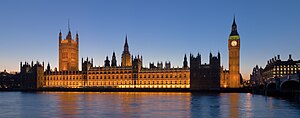Governance
Politics

England is part of the United Kingdom, a constitutional monarchy with a parliamentary system.[87] There has not been a government of England since 1707, when the Acts of Union 1707,[88] putting into effect the terms of the Treaty of Union, joined England and Scotland to form the Kingdom of Great Britain.[65] Before the union England was ruled by its monarch and the Parliament of England.
Today England is governed directly by the Parliament of the United Kingdom, although other countries of the United Kingdom have devolved governments.[89] There has been debate about how to counterbalance this in England. Originally it was planned that various regions of England would be devolved, but following the proposal's rejection by the North East in a 2004 referendum, this has not been carried out.[86] In 2024, an England-only intergovernmental body, known as the Mayoral Council for England, was established to bring together ministers from the UK Government, the Mayor of London and the leaders of combined authorities.[90]
In the House of Commons which is the lower house of the British Parliament based at the Palace of Westminster, there are 543 members of parliament (MPs) for constituencies in England, out of the 650 total.[91] England is represented by 347 MPs from the Labour Party, 116 from the Conservative Party, 65 from the Liberal Democrats, five for Reform UK and four for the Green Party of England and Wales.
Law

The English law legal system, developed over the centuries, is the basis of common law[92] legal systems used in most Commonwealth countries[93] and the United States (except Louisiana). Despite now being part of the United Kingdom, the legal system of the Courts of England and Wales continued, under the Treaty of Union, as a separate legal system from the one used in Scotland. The general essence of English law is that it is made by judges sitting in courts, applying their common sense and knowledge of legal precedent – stare decisis – to the facts before them.[94]
The court system is headed by the Senior Courts of England and Wales, consisting of the Court of Appeal, the High Court of Justice for civil cases, and the Crown Court for criminal cases.[95] The Supreme Court of the United Kingdom is the highest court for criminal and civil cases in England and Wales. It was created in 2009 after constitutional changes, taking over the judicial functions of the House of Lords.[96] A decision of the Supreme Court is binding on every other court in the hierarchy, which must follow its directions.[97]
The Secretary of State for Justice is the minister responsible to Parliament for the judiciary, the court system and prisons and probation in England.[98] Crime increased between 1981 and 1995 but fell by 42% in the period 1995–2006.[99] The prison population doubled over the same period, giving it one of the highest incarceration rates in Western Europe at 147 per 100,000.[100] His Majesty's Prison Service, reporting to the Ministry of Justice, manages most prisons, housing 81,309 prisoners in England and Wales as of September 2022.[101]
